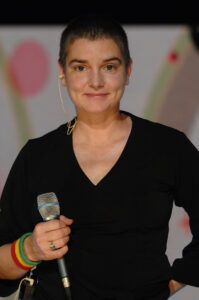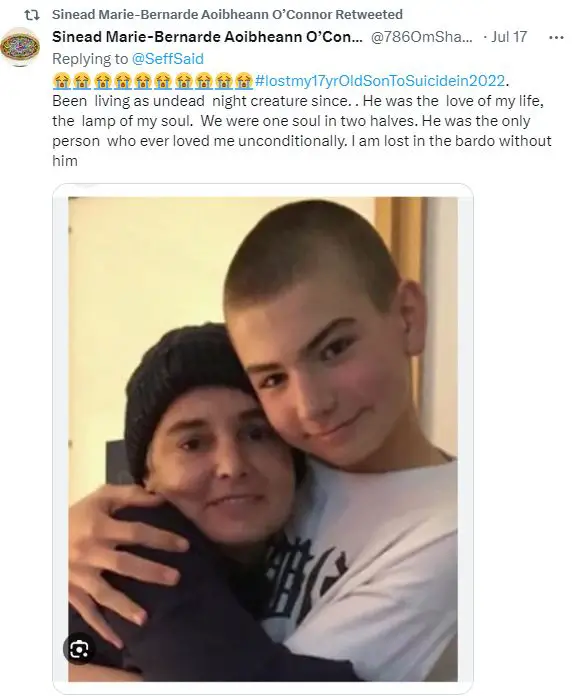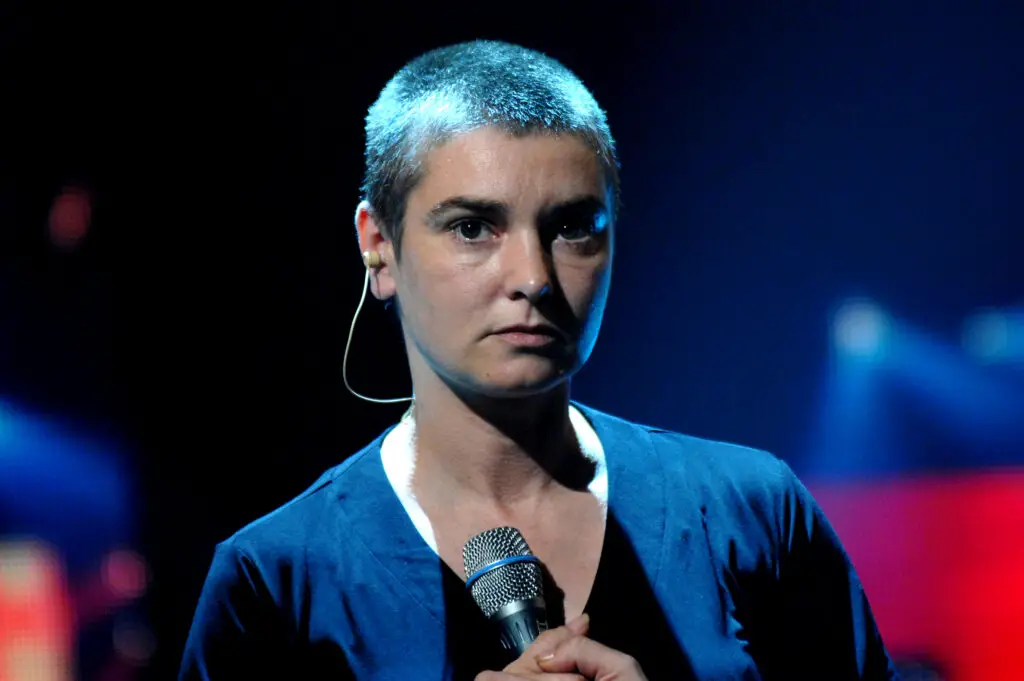Sinéad O’Connor was one of the most iconic and influential musicians of the 1990s.
Born in Dublin, Ireland, in 1966, O’Connor began her music career as a teenager, releasing her debut album “The Lion and the Cobra” in 1987. However, her second album, “I Do Not Want What I Haven’t Got,” released in 1990, catapulted her to international fame.
The album’s lead single, a cover of Prince’s “Nothing Compares 2 U,” became a smash hit, topping the charts in multiple countries and earning O’Connor a Grammy nomination.
The song’s haunting melody and emotional lyrics, combined with O’Connor’s powerful vocals and striking appearance – including her trademark shaved head – made her an instant icon.
Key Takeaways
- Sinéad O’Connor was a highly influential musician in the 1990s, known for her powerful vocals, striking appearance, and emotional lyrics.
- Her cover of Prince’s “Nothing Compares 2 U” was a massive hit, earning her international fame and a Grammy nomination.
- O’Connor was also known for her controversial statements and actions and struggled with mental health and personal relationships.
Sinéad O’Connor in the 90s
Sinéad O’Connor was born in Dublin, Ireland, in 1966.
She had a difficult childhood, marked by abuse and neglect.
Her parents divorced when she was eight, and she was sent to live with her emotionally unstable mother.
O’Connor has spoken publicly about the abuse she suffered by her mother and other family members, including sexual abuse.
Despite these challenges, O’Connor showed an early talent for music.
She began singing in a local choir and writing her songs as a teenager.
At 15, she left school and began performing in Dublin pubs and clubs.
In 1987, she signed a recording contract with Ensign Records and released her debut album, “The Lion and the Cobra,” the following year.
The album was a critical and commercial success, earning O’Connor a Grammy nomination for Best Female Rock Vocal Performance.
It showcased her powerful voice and ability to write deeply personal and politically charged lyrics.
A wide range of genres influenced O’Connor’s music, including folk, punk, and reggae.
In the early 1990s, O’Connor became known for her activism and music.
She spoke out against the Catholic Church and its influence in Ireland, particularly reproductive rights.
In 1992, she made headlines worldwide when she ripped up a photo of Pope John Paul II on “Saturday Night Live,” protesting the Church’s handling of the child abuse scandal.
Despite the controversy, O’Connor continued to release successful albums throughout the 1990s, including “I Do Not Want What I Haven’t Got” and “Universal Mother.”
She also became a mother, giving birth to a son in 1997 at 31.
Sinéad O’Connor @SaturdayNightLive stand against Catholic Church.
Breakthrough and Fame
In 1990, Sinéad O’Connor released her second album, “I Do Not Want What I Haven’t Got,” which included her cover of Prince’s “Nothing Compares 2 U.”
The single became a worldwide hit, topping the charts in multiple countries and earning O’Connor a Grammy Award nomination for Record of the Year.
The song’s music video, which featured O’Connor’s signature bald head and emotional performance, became an iconic image of the 90s.
O’Connor’s success with “Nothing Compares 2 U” propelled her to pop star status, and she became known for her unique voice, emotional lyrics, and outspoken views.
Her debut album, “The Lion and the Cobra,” had already gained her a cult following, but “I Do Not Want What I Haven’t Got” launched her into the mainstream.
In addition to her music, O’Connor made headlines for her controversial appearances on television, most notably on “Saturday Night Live” in 1992.
During a performance of Bob Marley’s “War,” she held up a photo of Pope John Paul II and tore it into pieces, denouncing the Catholic Church’s handling of abuse scandals.
The incident sparked widespread outrage and backlash, and O’Connor faced intense criticism and death threats.
Despite the controversy, O’Connor continued to tour and release music throughout the 90s, including the albums “Am I Not Your Girl?” and “Universal Mother.”
Her unique voice and powerful performances continued to captivate audiences, cementing her status as one of the most iconic artists of the decade.
Controversies and Protests
Sinéad O’Connor was known for her outspoken views on various topics, often leading to controversies and protests.
Apart from her views on religion, O’Connor was vocal about her opinions on war and abuse.
In 1991, she refused to perform at a concert in New Jersey, protesting against the Gulf War. She also spoke out against child abuse in the Catholic Church, giving her praise and criticism.
In 1990, O’Connor refused to perform at a concert in New York City’s Madison Square Garden because the National Anthem was played before her performance.
She believed that the Anthem was a symbol of oppression and did not reflect the country’s values.
Her protest sparked a national debate on patriotism and freedom of expression.
O’Connor’s views on abortion and politics also garnered attention.
In 1992, she refused to perform at a concert in Israel, citing her support for the Palestinian cause.
She was also a vocal advocate for women’s rights and the right to choose. Her views on abortion led to protests and calls for boycotts of her music.
Her protests and controversies often sparked national debates and led to calls for boycotts of her music.
Despite the backlash, O’Connor remained firm in her beliefs and continued to use her platform to speak out on important issues.

Mental Health Struggles
Sinéad O’Connor’s mental health struggles have been well-documented throughout her career.
In the 1990s, her battle with depression and bipolar disorder became increasingly public, leading to hospitalizations and a suicide attempt.
O’Connor has been open about the trauma she experienced during her childhood, including physical and sexual abuse.
These experiences undoubtedly contributed to her mental health struggles later in life.
In a 2017 interview with Dr. Phil, she stated that she had been diagnosed with post-traumatic stress disorder (PTSD).
In January 2022, O’Connor was hospitalized after posting alarming messages on social media.
Her hospitalization came just days after the death of her 17-year-old son, Shane. O’Connor has been vocal about the impact of her son’s death on her mental health, stating that it has been “the most traumatic thing that’s ever happened” to her.
Despite her struggles, O’Connor has been a vocal advocate for mental health awareness.
In a 2015 interview with Time, she stated, “mental illness is not something to be ashamed of.”
She has also been open about using medication to manage her conditions, stating that it has been “life-saving” for her.
Sinéad O’Connor’s mental health struggles have been a significant part of her life and career.
While she has faced many challenges, she has also been an essential voice in the mental health awareness and stigma conversation.
Singer Sinead O’Connor’s interview with Dr. Phil
Personal Life
Sinéad O’Connor had a tumultuous personal life in the 90s.
She married four times and had four children – Jake, Roisin, Shane, and Yeshua.
Her first marriage was to music producer John Reynolds, who co-produced several of her albums, including Universal Mother, in 1987.
She married her second husband, British journalist Nick Sommerlad, in mid-2001, but things ended three years later.
In 2018, she announced that she had converted to Islam and changed her name to Magda Davitt.
She said that her conversion was “the natural conclusion of any intelligent theologian’s journey” and that she was “proud to have become a Muslim.”
O’Connor has also been open about her struggles with mental health and has been diagnosed with bipolar disorder.
In 1999, she was hospitalized after attempting suicide.
She has since advocated for mental health awareness and has spoken openly about her experiences with depression and suicidal thoughts.
O’Connor remained a respected and influential artist throughout the 90s despite her struggles.
Her music and activism inspired many, and her legacy continues.

Later Career and Recent Years
After her critically acclaimed album “I Do Not Want What I Haven’t Got” in 1990, Sinéad O’Connor continued to release studio albums and tours throughout the 90s. In 1992, she released “Am I Not Your Girl?” which featured covers of classic songs from the 1930s and 1940s.
She followed this up with “Universal Mother” in 1994, a departure from her previous work and featuring a more spiritual and political message.
In the late 90s, O’Connor began to experience personal struggles and took a hiatus from music.
She made a comeback in 2000 with the album “Faith and Courage,” which was well-received and featured collaborations with Wyclef Jean and Brian Eno.
She released albums throughout the 2000s, including “Sean-Nós Nua” in 2002 and “Theology” in 2007.
In 2013, O’Connor released her tenth studio album, “I’m Not Bossy, I’m the Boss,” which received positive reviews and was noted for its feminist themes.
She also appeared as a guest star on the television series “Showtime” in 2015.
In recent years, O’Connor has been the subject of a memoir and a documentary. Her memoir, “Rememberings,” was released in 2021 and chronicled her life and career.
The documentary “Breaking the Silence,” was released in 2022 and explored her struggles with mental health and her advocacy for survivors of abuse.
Sinéad O’Connor remains a respected and influential artist with a passionate fanbase despite her ups and downs.
Her Death
Sadly Sinéad O’Connor passed away on July 26, 2023.
According to the Los Angeles Times, her family and friends were devastated by her sudden death and have requested privacy during this difficult Time.
Her final tweet, posted on July 17, was a tribute to her late son, Shane, who died by suicide in 2020.
According to the New York Post, the tweet read, “For all mothers of Suicided children.”
According to the BBC, “Police have stated that the death of Sinéad O’Connor is not being treated as suspicious after her body was found on Wednesday. The renowned singer and activist, famous for the song “Nothing Compares 2 U,” passed away at the age of 56 in her home in London.”

Impact and Legacy
Sinéad O’Connor significantly impacted the music industry in the 90s, becoming one of her time’s most prominent female artists.
Her music was popular and politically charged, making her a protest singer who used her voice to raise awareness of social issues.
O’Connor’s music was characterized by her unique voice and powerful lyrics that tackled issues such as religion, sexuality, and abuse.
Her most famous song, “Nothing Compares 2 U,” released in 1990, became an instant hit, topping charts worldwide.
The song’s music video, which featured a close-up of O’Connor’s face with a single tear rolling down her cheek, became an iconic image of the 90s.
O’Connor’s music was also known for its emotional intensity and vulnerability.
Her second album, “I Do Not Want What I Haven’t Got,” released in 1990, featured the hit single “The Emperor’s New Clothes,” which dealt with the themes of mental illness and suicide.
The album’s success solidified O’Connor’s position as a significant force in the music industry.
Today, O’Connor’s legacy inspires new generations of musicians and activists.
Her music and activism have left an indelible mark on the industry, paving the way for future female artists to use their voices to effect change.
RIP, Sinead; the music world has lost another genius.
Frequently Asked Questions
What was Sinéad O’Connor’s biggest hit?
Sinéad O’Connor’s biggest hit was a new arrangement of Prince’s song “Nothing Compares 2 U”. The song was released in 1990 as part of her second studio album, “I Do Not Want What I Haven’t Got.” It reached number one in several countries and became an international hit.
Why did Sinéad O’Connor rip the picture of the pope?
During a live performance on Saturday Night Live in 1992, Sinéad O’Connor ripped a picture of Pope John Paul II while singing Bob Marley’s “War.” The act was a protest against the sexual abuse of children by Catholic priests and the Church’s cover-up of the abuse. The incident sparked controversy and backlash, leading to a decline in her popularity.
What year did ‘Nothing Compares 2 U’ come out?
“Nothing Compares 2 U” was released in 1990 as part of Sinéad O’Connor’s second studio album, “I Do Not Want What I Haven’t Go.”.
Who wrote ‘Nothing Compares 2 U’?
“Nothing Compares 2 U” was written by Prince in 1985 for his side project, The Family.
Does Sinéad O’Connor have children?
Yes, Sinéad O’Connor has four children. She had her first child, Jake, in 1987 with her first husband, John Reynolds. She had her second child, Roisin, in 1995 with her second husband, journalist Nick Sommerlad. She had two more children, Shane and Yeshua, in 2004 and 2006, respectively.
What is Sinéad O’Connor’s religion?
Sinéad O’Connor was raised Catholic but has been critical of the Catholic Church and organized religion. She has explored various spiritual and religious beliefs, including Rastafarianism, Buddhism, and Islam.
She was ordained as a priest by the Latin Tridentine Church, a sect that the mainstream Catholic Church does not recognize
.In October 2018, Irish singer-songwriter Sinead O’Connor announced her conversion to Islam and changed her name to Shuhada’ Davitt.
She shared the news on her Twitter account, stating she was “proud to have become a Muslim.” O’Connor explained that her new faith was the “natural conclusion of any intelligent theologian’s journey.”
Her announcement was met with support and criticism, with some fans expressing their admiration for her courage and others questioning her decision.
O’Connor’s conversion to Islam significantly changed her personal and public identity.
Related Articles
Music of the 90s: A Trip Down Memory Lane

